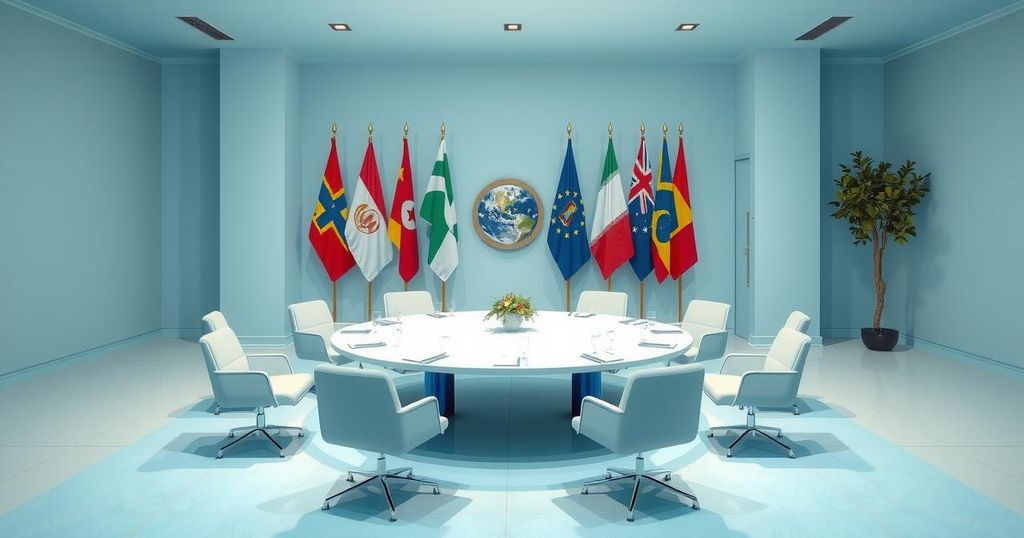On March 18, 2025, Qatar hosted a trilateral meeting with leaders from Rwanda and the DRC to promote peace. They discussed the progress of peace processes, reaffirmed commitments to ceasefires, and emphasized ongoing dialogue. The meeting reflects Qatar’s role as a mediator in regional conflicts and signals a collaborative approach to addressing issues affecting the DRC.
On March 18, 2025, the State of Qatar facilitated a significant trilateral meeting in Doha, aiming to alleviate tensions in the Eastern Democratic Republic of Congo (DRC). The meeting included His Highness Sheikh Tamim bin Hamad Al Thani, the Emir of Qatar; President Paul Kagame of Rwanda; and President Félix Tshisekedi Tshilombo of the DRC, focusing on collaborative peace efforts.
The leaders acknowledged the noteworthy advancements in ongoing peace processes, particularly the Luanda and Nairobi initiatives, as well as the joint summit held in Dar es Salaam, Tanzania, on February 8, 2025, by the East African Community and Southern African Development Community. The results of these summits significantly influenced the agenda for the discussions in Doha.
During the meeting, the heads of state reiterated their commitment to an immediate and unconditional ceasefire, a crucial agreement reached during the February summit, to foster stability in a region rife with conflict and unrest.
Reflecting a spirit of cooperation, President Kagame commended Qatar, stating, “We thank the State of Qatar and Sheikh Tamim for convening this meeting and for their positive role in building confidence and achieving a secure and stable future for the Democratic Republic of the Congo and its territory.” President Tshisekedi stressed the importance of ongoing dialogues to establish a solid foundation for sustainable peace.
Qatar has established itself as a vital mediator amidst escalating tensions between Rwanda and the DRC, particularly in light of recent attacks attributed to the M23 rebel group, believed to receive support from Rwanda. This geopolitical strife necessitates strengthened alliances for regional security.
Moreover, the participants agreed to perpetuate the dialogues initiated in Doha, aligning with the envisioned peace pathways of the merged Luanda and Nairobi processes. This collaboration seeks to foster reconciliation and resilience in peacebuilding efforts.
Qatar’s role in this trilateral meeting reflects a broader diplomatic strategy, engaging in ten international conflicts to foster stability. The Qatari Ministry of Foreign Affairs has noted the transformative impact of active participation in peace dialogues on conflict regions’ political landscapes.
This summit signifies an increasing recognition among African leaders of the importance of cooperative strategies in addressing conflict. The emphasis on unconditional ceasefire agreements plays a crucial role in facilitating constructive dialogue, essential for resolving the DRC’s ongoing issues and those affecting its neighboring countries.
The outcomes of this meeting provide hope for the DRC and exemplify how proactive diplomatic efforts can resolve longstanding conflicts across Africa. Furthermore, Qatar’s engagement serves as a potential model for other nations seeking to mediate peace and achieve regional stability.
In conclusion, the trilateral meeting hosted by Qatar represents a pivotal step towards meaningful progress in East Africa. Through diplomatic cooperation, leaders from Rwanda and the DRC have the opportunity to lay strong foundations for peace and stability, with Qatar’s role in mediation remaining critical amid the complexities of regional politics.
In conclusion, the trilateral meeting organized by Qatar has successfully set forth a pathway for enhanced peace efforts in the East African region. The collaboration among leaders from Rwanda and the DRC illustrates the potential of diplomatic engagements to foster stability. As these nations strive to fortify the principles of peace, Qatar’s continued commitment to mediation is anticipated to play a vital role in addressing the intricate challenges present in regional geopolitics.
Original Source: evrimagaci.org






